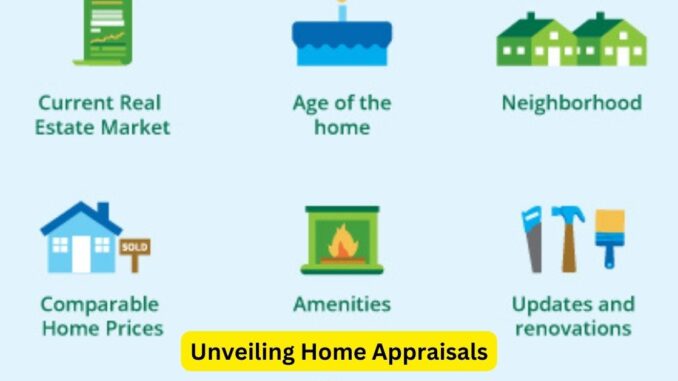
Home appraisals play a pivotal role in the mortgage approval process, influencing the amount lenders are willing to loan to prospective homebuyers. Understanding their significance and how they determine mortgage values is crucial for both buyers and sellers:
What is a Home Appraisal? A home appraisal is an unbiased assessment of a property’s value conducted by a licensed appraiser. It aims to determine the fair market value based on various factors like location, size, condition, and comparable sales in the area.
Role in Mortgage Approval: Lenders require appraisals to ensure the property’s value aligns with the loan amount. The appraisal helps mitigate the risk for the lender by providing an independent valuation of the property.
Key Factors Impacting Appraisal Values:
- Comparable Sales: Appraisers analyze recent sales of similar properties in the vicinity to gauge the property’s value.
- Property Condition: The overall condition of the home, including upgrades, renovations, and maintenance, influences its appraised value.
- Location: The neighborhood, proximity to amenities, school districts, and market trends significantly impact appraisal values.
- Size and Features: Square footage, number of bedrooms, bathrooms, and unique features all contribute to the property’s assessed value.
- Market Conditions: Appraisers consider current market conditions and trends affecting property values in the area.
How Appraisal Values Affect Mortgage Approval:
- Loan-to-Value Ratio (LTV): Appraisal values directly impact the LTV ratio—a crucial factor in loan approval. Lenders use the appraised value to calculate the percentage of the loan compared to the property’s value. A lower LTV ratio often translates to more favorable loan terms.
- Impact on Down Payments: Higher appraisal values can result in lower down payment requirements for buyers. Conversely, lower appraisals might necessitate larger down payments to meet lender requirements.
- Reassessment or Negotiation: In cases of lower-than-expected appraisals, buyers might renegotiate the purchase price with sellers or challenge the appraisal with additional evidence supporting the property’s value.
Preparing for the Appraisal:
- Enhance Curb Appeal: Ensure the property is well-maintained and presents favorably to the appraiser.
- Document Improvements: Provide documentation of any recent renovations or upgrades, showcasing the property’s added value.
- Research Comparable Sales: Gather information on recent sales of similar properties in the area that support your home’s value.
Appraisal Contingencies in Contracts: Buyers often include appraisal contingencies in purchase contracts. If the appraisal falls short of the agreed-upon purchase price, these contingencies offer options to renegotiate or walk away from the deal.
Appraisal Fees and Timelines: Buyers typically cover appraisal fees, which can range from a few hundred to over a thousand dollars. The appraisal is usually ordered shortly after the buyer applies for the mortgage, and the process typically takes a few weeks.
Understanding the correlation between home appraisals and mortgage values empowers buyers and sellers in the real estate transaction process. By comprehending the factors influencing appraisals and preparing effectively, both parties can navigate this critical step toward homeownership or property sale more confidently.
Leave a Reply